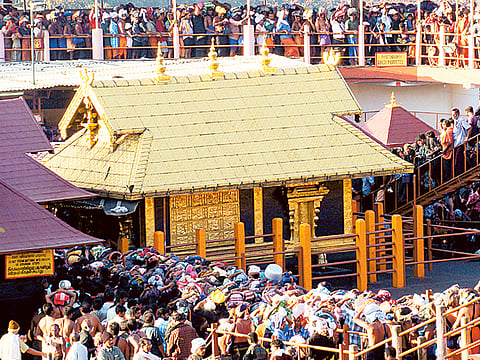Entry of women in Kerala's Sabarimala temple: 'Everyone can go,' says Supreme Court
The right of a woman to pray is a constitutional right and does not depend on laws, observes Indian top court

Today the Indian Supreme Court is set to rule on women's rights to make the pilgrimage to the famed Sabarimala temple in Kerala. The temple witnesses one of the largest pilgrimage journeys in the world with millions of devotees making the trip annually.
However, only girls younger than 10 (having not yet gone through puberty) and women older than 50 (after menopause) are allowed to make the pilgrimage in addition to men. All menstruating women regardless of age are prohibited from observing the pilgrimage prayers and entering the temple.
Here's everything you need to know about the situation.
What and where is the Sabarimala temple?
Sabarimala temple is a temple devoted to the Hindu deity 'Ayyappan'. The temple is located atop a hill in the Pathanamthitta district of Kerala and is surrounded by the Periyar Tiger Reserve, a dense forest. The temple is believed to be around 5000 years old, and is one of the oldest existing temples in the country.
Who can visit?
All men who've observed the 41-day long pilgrim rituals can enter the temple. There exists a traditional ban on the entry of women between 10 and 50 years of age in the Sabarimala temple. Women who are of an age to menstruate are restricted from entering the temple.
When is it open?
The temple is open for worship only during the days of Mandalapooja (usually November 15 to December 26), or 'Makar Sankranti' (January 14) and Maha Vishuva Sankranti (April 14), and the first five days of each Malayalam month.
What's happening now?
The Supreme Court on Tuesday began hearing on whether prohibiting the entry of women in Sabarimala on grounds of biological factors was discriminatory, and if it violates the constitution.
The petitioner - the Indian Young Lawyers Association - has challenged the 800-year-old practice of prohibiting the entry of women into the famed Lord Ayyappa Temple.
The PIL has sought direction to the Kerala government, the Travancore Devaswom Board, Chief Thanthri (priest) of Sabarimala Temple and the District Magistrate of Pathanamthitta to ensure entry of female devotees between the age groups of 10 to 50.
Comments of the Chief Justice
The right of a woman to pray is a constitutional right and does not depend on laws. There is no concept of a temple for private use, once you open a temple, everybody can go - the Indian Supreme court made these observations while hearing arguments pertaining to the entry of women of all ages in Kerala’s famous Sabarimala temple.
"On what basis you deny the entry. It is against the Constitutional mandate," Chief Justice Dipak Misra said.
"Every woman is also the creation of God and why should there be discrimination against them in employment or worship," said Justice DY Chandrachud, who is part of the five-judge Constitution bench hearing the case
Article 14 guarantees the right to equality, Article 15 prohibits discrimination on grounds of religion, race, caste, sex or place of birth, and Article 17 abolishes untouchability and forbids its practice.
The constitution bench comprising of Chief Justice Dipak Misra, Justice Rohinton Fali Nariman, Justice A.M. Khanwilkar, Justice D.Y. Chandrachud and Justice Indu Malhotra will address four questions framed by a three judge bench while referring the matter to a five judge constitution bench on October 13, 2017.
Appearing for the petitioner, counsel Ravi Prakash Gupta told the court the restrictions on the entry of women in Sabarimala temple is not the essence of their religious affairs as discrimination on the entry of women in the temple is "neither a ritual nor a ceremony associated with Hindu religion".
Gupta said: "Mere sight of a woman does not affect anybody's celibacy, if one has taken oath of it, otherwise such oath has no meaning."
What are the angles being discussed?
The constitution bench will examine whether the exclusion of women based on biological factors amounts to "discrimination" and violates the very core of Articles 14, 15 and 17 and not protected by 'morality' as used in Articles 25 and 26 of the Constitution.
The court has heard arguments focusing on whether excluding women (in the age group of 10-50 years) constitutes an "essential religious practice"" under Article 25, and "whether a religious institution can assert a claim in that regard under the umbrella of right to manage its own affairs in the matters of religion?"
Besides, the court will address the question whether "Ayyappa Temple has a denominational character" and if it was permissible for religious denomination managed by a statutory board and is funded by the Kerala and Tamil Nadu governments to indulge in practices "violating the constitutional principles/morality".
With Inputs from IANS
Sign up for the Daily Briefing
Get the latest news and updates straight to your inbox



